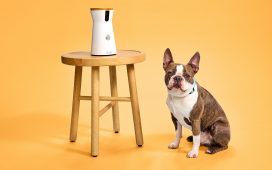You’ve figured out the best airline to fly a pet on, you’ve picked out the perfect cat carrier, and you’ve memorized every Pet Relief location on the airport map. You’re confident you’ve done everything to prepare, but the day of your flight arrives, the plane hasn’t even taken off yet, and you already have a cat carrier filled with pee and a restless cat meowing in frustration every five seconds.
As glamorous as Taylor Swift makes it look to jet-set across the country with your cat, I’ve traveled with mine enough times to know that it can be a stressful experience, for both you and your feline friend. But you don’t have to just cross your fingers and hope for the best every time you travel together. Here are a few veterinarian-approved ways to calm down your cat before a long flight or road trip.
1. Start the Morning With a Smaller Breakfast
How you act the morning of your trip sets the tone for your cat’s entire travel experience. If you’re acting rushed and overwhelmed, your cat will pick up on this and feel rushed and overwhelmed too. Just like we start off a stressful Monday with a cup of coffee, start your cat off with a yummy breakfast — but one that’s lighter than normal. Dr. Tammy Hunter, DVM, a veterinary consultant for VCA Animal Hospitals, recommends, “On the day of travel, withhold breakfast from your cat. Traveling on an empty stomach minimizes the risk of nausea and vomiting.” Keep in mind that this does not mean you should completely starve your cat. Dr. Hunter emphasizes that it’s important you also make sure to “Feed a small meal when you arrive at your evening destination.”
2. Extra Playtime Goes a Long Way
A long flight isn’t so bad when you can sleep through most of it, and that goes for cats, too. If your cat is already tuckered out by the time you leave for your destination, the less stressful the trip will feel to them. Dr. Hunter says, “A successful road trip with a cat begins long before the day of travel,” so the week leading up to a trip, or even just the night before, squeeze in a few extra sessions of playtime to their routine. After a few taxing rounds of yarn ball, any cat would be eager for naptime, even if it’s inside a cat carrier on a plane.
3. Talk Therapy Is For Cats, Too
If you’re sick of your friends calling you “a crazy cat lady” over how much you spoil your cat, this probably won’t help your case, but talking to your cat to ease their anxiety is veterinarian-recommended. Dr. Hunter points out that “cats are place-oriented beings who would rather stay in their own space than move out of their comfort zone,” which means the only source of comfort to your cat during a trip is your presence. One of the best ways to compensate for the presence of unfamiliar sounds and voices in an airport is to introduce one that your cat is very familiar with — yours. It’s as simple as having a conversation with them. If you can’t bring yourself to talk to your cat in the presence of the strangers sitting next to you, at least make sure to angle the cat carrier so your cat can easily see your face. But avoid making shushing sounds, as your cat could confuse this with hissing and become further agitated.
4. Leave Behind “Scent Messages” in Their Cat Carrier
Dr. Katy Johnson Nelson, DVM, a veterinary consultant for Chewy and Petco, introduced me to a few products that veterinarians have developed especially for cats and dogs with anxiety. Her No. 1 recommendation for travel is to use pheromone spray or pheromone wipes. Dr. Nelson explains, “Mother dogs and cats communicate with their offspring through natural pheromones that the mother’s body releases into the air. These odorless ‘messages’ provide a signal of security and comfort to the babies.” Products like Feliway Adaptil Cat Comfort Wipes ($20), or Relaxivet Pheromone Comfort Spray ($18), conveniently available at your veterinarian’s office or local pet supply store, consist of synthetic feline facial pheromones that mimic this signaling and can be particularly useful for a day of stressful travel. Ten to 15 minutes before letting your cat walk into their carrier, lightly spray or wipe it down with a pheromone product, and let it work its magic.
5. Drape Them in a Pet-Safe Weighted Blanket
Weighted blankets (for humans) have surged in popularity thanks to their natural effects on insomnia and anxiety, and Dr. Nelson recommends them for cats and dogs, too. By creating “a snug-fitting pressure wrap over a pet’s chest, which is alleged to release endorphins similar to those released with a hug,” a weighted blanket works great in any anxiety-inducing situation, like a loud thunderstorm, someone vacuuming the carpet, and, of course, travel. Though weighted blankets aren’t guaranteed to calm down every cat, Dr. Nelson affirms, “Anecdotal evidence suggests that more than half of pets respond to the use of calming vests. They cause no harm, so they could be worth a try if your pet suffers from anxiety.” Just be sure you use one that’s designed to be used for a pet or a child, like a Hypnoser Weighted Blanket ($20) or a ThunderShirt ($40). Weighted blankets come in a variety of sizes and weights, and if your cat has asthma or any respiratory issues, a weighted blanket that’s too heavy could be more harmful than helpful.
6. Pack Some Catnip as a Snack
Agreeing with Dr. Hunter that a light breakfast helps minimize the risk of nausea and vomiting, Dr. Nelson suggests feeding your cat small treats during travel instead of a large, overfilling meal beforehand. She recommends opting for “products containing herbs like valerian, passion flower, chamomile, ginger and lemon balm.” One hundred percent all-natural treats like catnip are ideal for travel because they “provide a natural approach to helping your pet’s body cope with stress hormones.” When you’re packing snacks, remember that the goal isn’t to keep your cat’s mouth busy, or to overfeed them to prevent them from meowing in hunger. The goal, as Dr. Nelson reminds us, is “to support a healthy stress response and encourage relaxation,” and processed treats only serve as “junk food” to cats.
Cats by nature are homebodies, so any type of travel — no matter how short the duration — can easily turn into an anxiety-ridden ordeal. We often say that traveling is one of the best ways to live your life to the fullest, but apparently when you have nine lives, all you want to do is stay home and relax. Put your mind and your cat at ease with all or any combination of these veterinarian-approved tips, and your trip will go from claw-ful to purr-fect.








